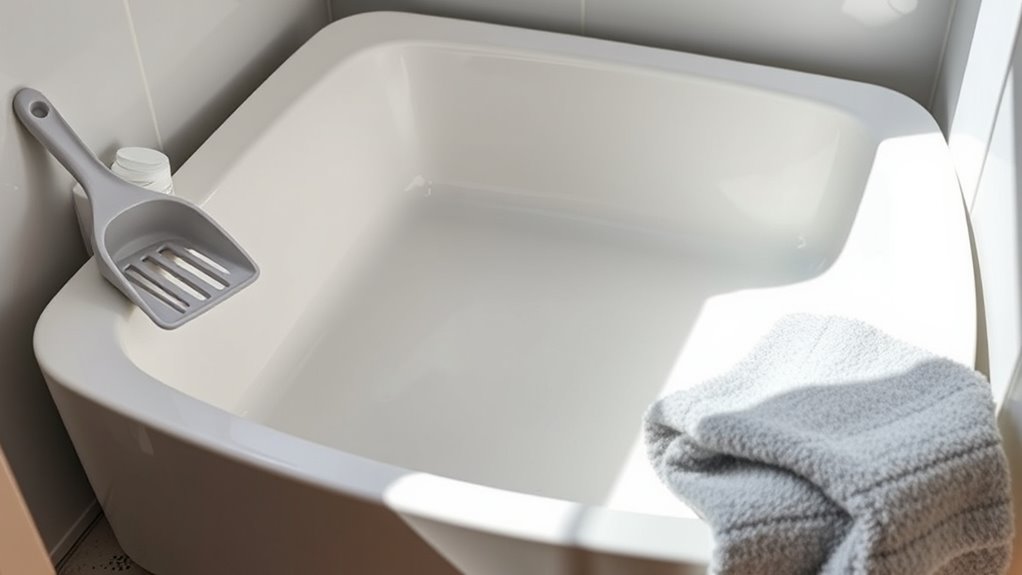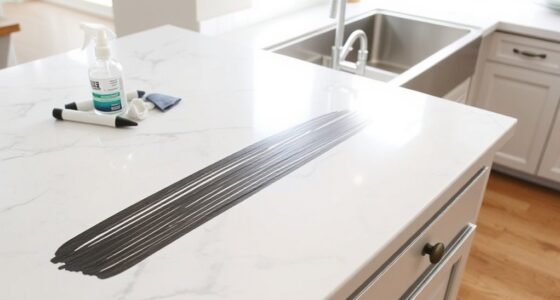To end ammonia smells, start by removing all litter and disinfecting the box thoroughly with a pet-safe cleaner or vinegar solution. Scrub all surfaces, paying close attention to corners and seams, then rinse well and let it dry completely in sunlight, which helps eliminate bacteria. Refill with fresh, high-quality litter, and continue daily scooping. Regular deep cleans will keep odors at bay, and more tips await if you explore further.
Key Takeaways
- Remove all litter and waste, dispose of them in sealed bags to eliminate lingering ammonia odors.
- Scrub the litter box thoroughly with a pet-safe cleaner, paying special attention to corners and seams where residues accumulate.
- Rinse the box completely to remove soap residues, then dry it in sunlight to naturally disinfect and reduce ammonia smell.
- Disinfect the box and tools with vinegar solution or pet-safe disinfectant to neutralize ammonia and prevent odor recurrence.
- Refill with high-quality, clumping litter and maintain daily scooping to prevent ammonia buildup and keep the environment fresh.

A deep clean of your litter box is essential to maintain a healthy and odor-free environment for your cat. Over time, cat odor can become overwhelming if you don’t regularly give your litter box the attention it needs. Even with daily scooping, built-up waste and residues can cause persistent smells that bother both you and your feline friend. To tackle this, you need to go beyond surface-level cleaning and perform a thorough deep clean using the right cleaning tools. This process not only reduces odors but also helps prevent infections and keeps your cat comfortable and healthy.
Start by removing all litter from the box. Dispose of it in a sealed bag to prevent lingering smells from spreading. Next, empty the entire litter box, even if it looks clean on the surface. Use sturdy gloves to protect your hands and be prepared for the strong odor that may escape during this step. Once empty, scrub the interior with a brush and a cleaning solution specifically designed for pet surfaces or a mix of mild dish soap and water. Avoid harsh chemicals, as they can leave residues that irritate your cat’s paws or cause further odor problems.
Pay special attention to corners and seams where waste and residues tend to accumulate. Scrubbing thoroughly will break down any stubborn deposits that contribute to persistent cat odor. After scrubbing, rinse the box thoroughly with clean water to remove all soap residue, which can also trap odors if left behind. Once rinsed, dry the box completely with clean towels or allow it to air dry in the sun—sunlight helps eliminate bacteria and odor-causing germs naturally. Incorporating a vacuum cleaner with strong suction power can also help remove dust and loose debris from the surface of the box and surrounding area, ensuring a more thorough clean.
When it comes to cleaning tools, use dedicated brushes and sponges that you only use for litter boxes. This prevents cross-contamination and keeps your tools free from lingering smells. Consider disinfecting your cleaning tools regularly by soaking them in a vinegar solution or a pet-safe disinfectant. This extra step ensures that your tools won’t reintroduce odors or bacteria into the clean box.
After the box is dry, refill it with fresh, high-quality litter. Use a scoop to add just enough so that your cat can dig comfortably without excess litter that can trap odors. Regularly scooping waste daily is still necessary, but this deep clean acts as a reset, drastically reducing the buildup that causes ammonia smells. Performing this deep clean at least once a month will keep your cat’s environment fresh, odor-free, and welcoming, making both your lives easier and more pleasant.
Frequently Asked Questions
How Often Should I Deep Clean My Litter Box?
You should deep clean your litter box at least once a week to maintain good litter box maintenance and odor control strategies. Regular deep cleaning helps eliminate ammonia smells and prevents buildup of bacteria. If you have multiple cats or notice strong odors sooner, consider cleaning more often. Consistent deep cleaning keeps your cat comfortable and your home smelling fresh, ensuring your litter box stays hygienic and odor-free.
Can I Use Natural Remedies to Eliminate Ammonia Smells?
Yes, you can use natural deodorizers like baking soda or activated charcoal to help eliminate ammonia smells. Enzyme cleaners are also effective because they break down the ammonia and other odors caused by urine. Regularly sprinkling natural deodorizers in the litter box and using enzyme cleaners during deep cleans can keep the smell at bay without relying on harsh chemicals. Just be sure to thoroughly rinse and dry the box afterward.
What Types of Litter Help Reduce Ammonia Buildup?
You should try clumping litter and silica gel to reduce ammonia buildup. Clumping litter makes it easy to remove waste, which helps prevent ammonia from accumulating. Silica gel absorbs moisture and odors effectively, keeping the box fresher longer. Regularly scooping the litter and replacing it as needed also helps control ammonia odors. Using these types of litter can considerably minimize ammonia smells and create a cleaner environment for your cat.
Are There Specific Cleaning Products to Avoid?
You should avoid chemical cleaners and products with fragrance additives when cleaning your litter box. These can leave residues that worsen ammonia smells and irritate your cat’s sensitive nose. Instead, opt for mild, unscented cleaning solutions like diluted vinegar or baking soda. Regularly cleaning the box and thoroughly rinsing it helps prevent ammonia buildup without exposing your pet to harmful chemicals or strong fragrances.
How Can I Prevent Ammonia Odors Between Deep Cleans?
To prevent ammonia odors between deep cleans, use odor absorbers like baking soda or charcoal in the litter box area. Regularly scoop waste to reduce buildup. Improve ventilation by opening windows or using fans, which helps disperse fumes and freshen the air. You can also place air purifiers nearby. Consistent maintenance and good airflow make a big difference in keeping ammonia smells at bay until your next thorough cleaning.
Conclusion
Imagine your litter box sparkling, free of stubborn ammonia smells, as if a invigorating gust has swept through. With a thorough deep clean, you’ll see the difference—your space smells clean, and your cat will appreciate the revitalizing environment. The once overpowering scent will vanish, replaced by a subtle, inviting aroma. Keep up with regular cleanings, and you’ll enjoy a fresher, more comfortable home where every scoop feels like a breath of fresh air.









